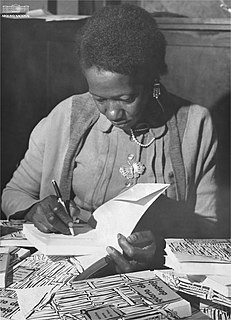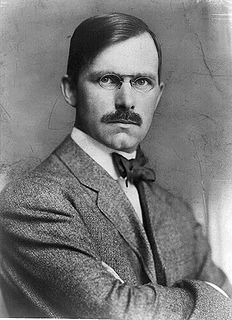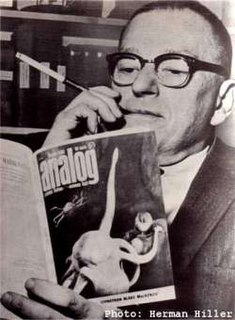A Quote by W. E. B. Du Bois
Unfortunately there was one thing that the white South feared more than Negro dishonesty, ignorance, and incompetency, and that was Negro honesty, knowledge, and efficiency.
Quote Topics
Related Quotes
The religious philosophy that they had adopted, in my opinion, was the only thing and is the only thing that can remove the white from the mind of the white man and the negro from the mind of the negro. I have seen what Islam has done with our people, our people who had this feeling of negro - and it had a psychological effect of putting them in a mental prison.
I maintain that I have been a Negro three times--a Negro baby, a Negro girl and a Negro woman. Still, if you have received no clear cut impression of what the Negro in America is like, then you are in the same place with me. There is no The Negro here. Our lives are so diversified, internal attitudes so varied, appearances and capabilities so different, that there is no possible classification so catholic that it will cover us all, except My people! My people!
I adore my black skin and my kinky hair. The Negro hair is more educated than the white man's hair. Because with Negro hair, where you put it, it stays. It's obedient. The hair of the white, just give one quick movement, and it's out of place. It won't obey. If reincarnation exists I want to come back black.
Before and after emancipation, the Negro, in self-defense, was propelled toward the white employer. The endowments of wealthy white men have developed great institutions of learning for the Negro, but the freedom of action on the part of these same universities has been curtailed in proportion as they are indebted to white philanthropies.
There is great fear expressed on all sides lest this war shall be made a war for the negro. I am willing that it shall be. It is awar to found an empire on the negro in slavery, and shame on us if we do not make it a war to establish the negro in freedom--against whom the whole nation, North and South, East and West, in one mighty conspiracy, has combined from the beginning.
We should emphasize not Negro History, but the Negro in history. What we need is not a history of selected races or nations, but the history of the world, void of national bias, race, hate, and religious prejudice. There should be no indulgence in undue eulogy of the Negro. The case of the Negro is well taken care of when it is shown how he has far influenced the development of civilization.
When the Negro was completely an underdog, he needed white spokesmen. Liberals played their parts in this period exceedingly well.... But now that the Negro has rejected his role as an underdog, he has become more assertive in his search for identity and group solidarity; he wants to speak for himself.

































